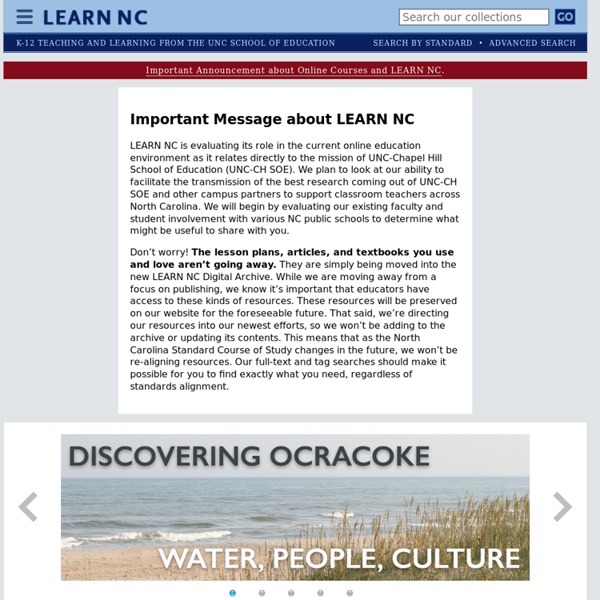



Connexions North Carolina History: A Digital Textbook - LEARN NC Primary sources, multimedia, readings, and lesson plans to tell the many stories of North Carolina's past. Replace your textbook — or enhance your teaching with selections. Get started Sampler An overview with samples of the kinds of readings, primary sources, and multimedia available. Educator’s Guides Best practices, process guides, worksheets, and other resources for teaching with the digital textbook. Explore by era Precolonial (to 1600) Natural history, American Indians before contact, the Lost Colony, and the Columbian Exchange. Colonial (1600–1763) Migration, government, religion, and daily life from the first successful English colonies to the eve of the Revolution. Revolution (1763–1789) The Regulators, the resistance to Great Britain, the War for Independence, and the creation of new governments. Early National (1789–1836) Politics, society, and culture from the 1790s to the 1830s, including education, reform, and the growth of slavery. Antebellum (1836–1860) Civil War (1860–1876)
4Teachers : Main Page کتاب هدهد Advanced Enabled Broadband Learning (ABEL) Assists Educators with 21st Century Learning | SNOW Imagine a classroom from the late 1980s. You can most likely conjure desks, pencils and chalkboards. What you won’t picture are interactive whiteboards, cell phones or tablets. It’s hard to believe today, but less than two decades ago computers were only slowly being introduced as teaching tools in the classroom and educators didn’t know exactly how or why to incorporate them into the teaching curriculum. In 2011, educators can still sometimes struggle with 21st century learning and how to adapt their teaching styles and curriculums to students who are becoming more technologically savvy at an increasingly younger age. Students in a blended learning environment with their teacher, an ABEL member. Studies show that adaptive and assistive technology work especially well for students who have special needs and/or learning disabilities. ABEL’s Professional Learning Program is differentiated in its approach to providing training sessions for members meeting the needs of all types of learners.
HippoCampus - Homework and Study Help - Free help with your algebra, biology, environmental science, American government, US history, physics and religion homework STEM Resources Welcome to the STEM page, sponsored by YALSA's STEM Task Force. We hope you will use this wiki page to get ideas on how to effectively integrate STEM into your library programs and services. And what is STEM you ask? STEM stands for Science, Technology, Engineering, and Math and is one of the hottest topics in education and library circles. STEM programming is one way to engage teens in your library and encourage learning and exploration in new ways. We think this page is a good start on STEM resources, but we need your help to make it great. BUILDING GREAT STEM LIBRARY COLLECTIONS[edit] Carnegie Library of Pittsburgh: An extensive collection of STEM subject and career educational resources. The National Science Teachers Association: Annual best books lists, Outstanding Science Trade Books for Students K–12, going back to 1996. YALSA’s blog, The Hub: A recent post on SciFi for Everyone. Locus Magazine: Recommended Reading List 2011. VOYA: Nonfiction Honor List. YOUNG ADULT NON-FICTION[edit]
All About Adolescent Literacy | AdLit.org فرهنگنامه کودکان و نوجوانان Express 10.11 - Differentiating Without Drowning Differentiating Without Drowning Charlotte Foster In today's classrooms of 25 or more students from diverse backgrounds, teachers strive to quickly become differentiation experts as well as subject area instructional experts. Create your normal lesson plan for the day (you may even begin with a basic Common Core–aligned textbook lesson). If you can do this once a week, you will eventually create an evolving, differentiated approach to your current instructional practice. References Bender, W.N., & Crane, D. (2011). Small, M. (2009). Tomlinson, C. (1999). ASCD Express, Vol. 10, No. 11.
Online: Curriculum Resources Find detailed information about thousands of teaching materials for K-12 math and science. Comprehensive catalog records describe each item in this database. Search Use a search engine and different terms to locate materials for your math and science classes. Browse Use ENC's carefully chosen subject terms to locate materials in the collection. Resource of the Day Each weekday, ENC highlights one valuable resource from our extensive collection of teaching and professional development materials. About Curriculum Resources Learn about the ENC collection in detail, see a list of resource vendors, and find frequently asked questions.
Inside Search Google is the most popular search engine on the web. Most of us rely on Google search for finding information. Sometimes it can be difficult to find just the right information we are actually looking for out of the hundreds or thousands of results returned in Google’s search. Towards this end, in July 2012 Google created an online course called Power Searching with Google. The Google Power Searching course is available online on edX as an Xseries program. Go to Power Searching with Google Course The course is structured as a series of 6 modules, each of which comprises of 5-6 short video lessons. The instructor of the course is Daniel M. This Power Searching course introduces participants to the idea of search, how Google works, and gives them the methods, strategies and tactics to find what they need to find. This XSeries program in Power Searching with Google is open for all and self-paced, so everyone can learn at their own pace without being locked in a schedule.
Welcome to The University of Texas at San Antonio | UTSA